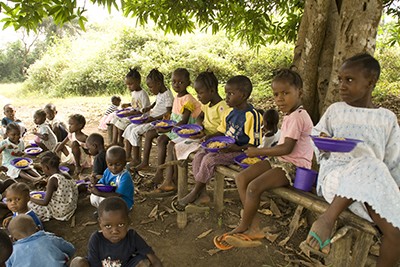
In the Liberian village of Sanoyea, mothers dance to music and sing their names during a get-to-know-you game, while their children play and snack on fruit and porridge. At this meeting, they learn from trained leaders about breastfeeding, hygiene, preparing nutritious food, and other ways to keep their children healthy.
The Liberian Agricultural Upgrading, Nutrition, and Child Health (LAUNCH) program, which forms mothers groups like this one, has been working since 2010 to mend a society broken by years of civil war. Between 1989 and 2003, successive civil wars left half the Liberian population food insecure and lacking access to safe water, sanitation, and health services.
LAUNCH is working to empower tens of thousands of Liberia’s most vulnerable to lift themselves out of poverty. A USAID Food for Peace program, LAUNCH, which is implemented by ACDI/VOCA, Project Concern International (PCI), John Snow Inc. (JSI), and Making Cents International (MCI), supports the U.S. Government’s Feed the Future Initiative. The program repairs infrastructure; improves water, sanitation, and hygiene (WASH); teaches farmers more efficient agricultural methods; and councils mothers on boosting child and maternal nutrition. Most importantly, it brings community members together to address some of their most dire development problems while fostering strength through deep-seated bonds.
In Their Hands
More than seven percent of children die before their 5th birthdays in Liberia. In an effort to boost maternal and child nutrition, LAUNCH brings mothers together to educate them on important health issues. Mothers have found the sessions valuable and are eager to share their knowledge with their peers. “I teach other mothers to pound and boil plantains like I do to feed my boys,” said Patience, one of the 14,000 members of the care groups. The program also trains health facility workers on child health and provides more than 89,000 of Liberia’s most vulnerable women and children with healthy food such as corn-soy blend packets, bulgur wheat, and yellow peas.
“LAUNCH is aggressively seeking to reduce malnutrition and illness in women and children, and build strong community resilience,” said Joe-Hoover Gbadyu, a food security specialist at USAID/Liberia. This means addressing the underlying causes of poor nutrition, and chief among them is poor WASH. Inadequate WASH causes diarrheal disease, which leads to malnutrition because of reduced intake of nutrients. LAUNCH is building or repairing 120 wells and building or repairing institutional latrines in clinics and schools.
But infrastructure is just the start. LAUNCH is helping form groups of determined Liberians who are improving WASH at the grassroots level. Community Water Committees educate communities about latrine use, handwashing, and other hygiene issues and maintain water points. Parent-teacher associations focus on upgrading WASH in schools. “Community groups have taken ownership of the LAUNCH program and will do all that they can to make sure WASH improvements are sustainable,” said Jolene Mullins, PCI’s country representative.
From Surviving to Thriving
Liberian farmers are also gathering to support each other as they learn the skills to combat food insecurity in their communities.
LAUNCH has helped form over 250 farmer groups, in which members are taught to better manage natural resources and sustainably boost yields. “Water conservation is emphasized during the training program, mostly for management of soil moisture during the dry season and for control of runoff during the rainy season. Mulching, mounds, and ridging are some of the water-saving techniques the program promotes,” said Mr. Gbadyu. The program has created 260 demonstration plots so farmers can practice and perfect the new techniques together, before adopting them on their individual farms.
“We are trying to foster self-sustaining livelihoods,” said Emmanuel Mugabi, ACDI/VOCA’s chief of party for LAUNCH.
However, the program has had to combat a sense of futility. After years of violence, some people do not see the value of learning new skills and investing in their own futures. “Many farmers still expect the LAUNCH program to provide free inputs,” said Mr. Gbadyu.
To counter this mindset, LAUNCH employs community extension workers who counsel farmers on the value of learning new production methods. It is a slow process, but one that pays off as farmers gain not only food and money, but also skills and confidence. “We promote community commitment and contribution as the basis for sustainability,” Mr. Gbadyu said.
Now LAUNCH is looking to foster hope and opportunity in the next generation. It is bringing its successful small-group approach to schools and teaching teenagers and young adults about markets, financial literacy, and how to set up lucrative agriculture businesses.
Empowerment is contagious in the formerly war-torn country. Kpannah Fireman, a women’s care group leader asserted, “Women can stand on our own two feet.” Across Liberia, more people like Kpannah are banding together to solve their own problems, embodying the African proverb that says, “Sticks in a bundle are unbreakable.”
C. Zeilberger







Comment
Make a general inquiry or suggest an improvement.